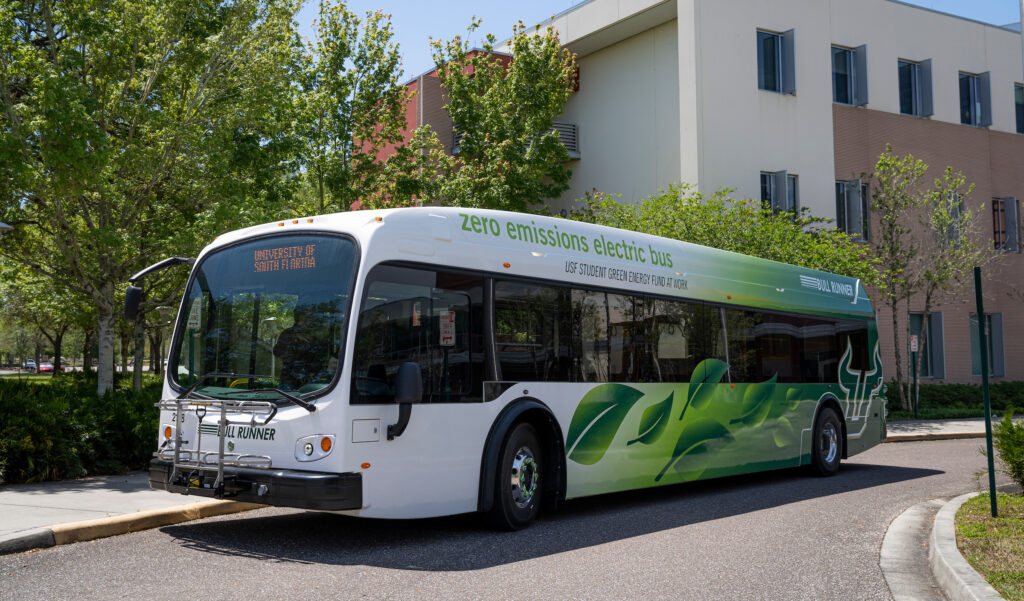OPINION: Electric Bull Runner can help USF environmentally and economically

USF Parking and Transportation Services (PATS) on April 22 debuted a battery-powered electric bus to its fleet of Bull Runners, signaling a positive transition toward more economically and financially efficient transportation options.
The new addition could assist in decreasing the university’s greenhouse emissions and transportation costs, as well as help USF retain its reputation as an environmentally focused university, reducing carbon dioxide emissions by 230,000 pounds a year, according to the bus’ manufacturer.
USF currently uses biodiesel — fuel created by naturally occurring resources like plants and animals — to fuel its Bull Runners, which has been shown to produce similar negative effects on the environment as diesel buses.
“Since biofuels are burned similarly to diesel in a bus engine and emitted via tailpipe, many of the negatives of diesel power remain with biofuel-powered buses,” stated a 2020 analysis on the cost and benefits of electric vehicles published by the Multidisciplinary Digital Publishing Institute.
Battery-powered vehicles were found to produce less carbon emissions than biodiesel-powered vehicles by researchers at Carnegie Mellon University’s Wilton E. Scott Institute for Energy Innovation in 2017. By switching to electric as opposed to biodiesel, USF could continue to help the environment.
In every U.S. state, electric buses were found to produce less greenhouse emissions than natural gas buses like biodiesel, according to a 2018 study by the Union of Concerned Scientists, making battery-powered vehicles the best option for a more sustainable form of transportation on campus.
PATS is adding this new addition to its Bull Runner route to promote environmental sustainability, reflective of USF’s prestigious reputation as environmental leaders.
USF prides itself on its environmental achievements, having been ranked first in Florida for its sustainable impact by the 2019 World University’s Impact Rankings and third in the nation in 2021 by the same organization. The university’s prestigious title in sustainability holds true as it adds its newest Bull Runner.
“It certainly cuts back on the greenhouse gas emissions significantly,” said Director of Parking and Transportation Services Raymond Mensah in an interview with The Oracle. “In line with where we want to go from a sustainability standpoint, I think it’s a pretty significant impact and heading in the right direction.”
Despite the university’s recent decision to accept development proposals for its 769-acre forest preserve, which would be detrimental to the plant and wildlife that inhabit the area, beginning to provide sustainable transportation options to students and faculty allows USF to retain its positive reputation.
The new Bull Runner will not only assist USF environmentally but also economically. Initial costs for battery-powered buses average about $120,000 more than the biodiesel buses, according to a 2018 analysis by the Environmental America Research and Policy Center, and the initial costs for USF’s buses reflect this analysis.
USF’s biodiesel buses are priced at about $500,000 each while the new electric bus is about $900,000, according to PATS. However, the reduced cost in biodiesel and the ability to combine environmental and transportation budgets could help USF’s finances over time. With support from the Student Green Energy Fund, PATS actually only contributed $349,000 of its 2020-21 transportation reserve account to the project.
The university will be saving money by no longer having to pay for gas, which costs $1.95 per gallon, according to the Hillsborough Area Regional Transit Authority. That cost will be eliminated since gas does not need to be purchased for battery powered buses, working solely off of a $170,052 charging station, which is $42,822 less than the almost $213,000 PATS spent on biodiesel in fiscal year 2019-20, according to PATS.
Switching to electric-powered buses is more environmentally and economically sustainable than biodiesel buses, making USF’s new addition to its Bull Runner fleet a progressive and constructive decision. USF should continue to invest in electric Bull Runners, eventually switching its fleet of buses to 100% electricity efficient, eliminating its need for biodiesel-powered buses.







